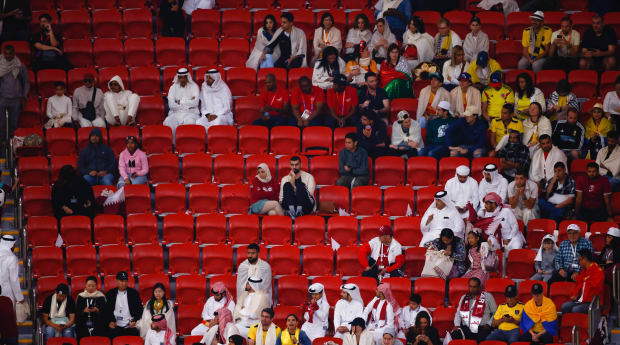From emptying stands to an uninspired performance on the field, the host nation’s incompetence was on full display in every corner of the Al-Bayt Stadium.
Sportswash that.
Amid everything else, all the far more serious discussions about gay rights, women’s rights and the exploitation of migrant workers, about the timing of the tournament and the lack of preparation time, the full inappropriateness of Qatar as World Cup host was laid bare. It wasn’t just that Qatar lost 2–0 to Ecuador, or the tepid nature of the performance, it was the way the stands emptied at halftime and didn’t fill up. So much for the supposedly burgeoning local football culture.
Qatar is the Asian champion. It reached the semifinal of the Gold Cup. It’s obviously not that bad of a side. Nerves must have played a part, but this was a truly dismal performance, an enormous embarrassment. As the Qatar World Cup slogan goes, “Expect amazing” … just not from the home team, the first host since 1934 not previously to have played in the tournament and the first host ever to lose its opening game.
“There’s no excuse,” said Qatar’s Spanish coach Felix Sanchez. “There is a lot of room for improvement. We did not play at our best level. Maybe the responsibility, the nerves took the best of us. We had a terrible start. We weren’t accurate at all in technical deliveries. We did not manage to pass the ball more than four times. There were defensive valleys. We let their players go through our lines, the transitions were not well-balanced and this really hurt us.”
About an hour-and-a-half before kickoff, the Emir had come out and waved to the crowd. There was a cheer, but it was muted because the stands were only half-full. Perhaps the people of Qatar simply weren’t than enthused by the prospect of seeing K-Pop sensation Jungkook perform at the opening ceremony. Or perhaps they were stuck in the enormous traffic jam that stretched as far as the eye could see down the four-lane highway from the Al-Bayt Stadium towards Doha.

IMAGO/Fotoarena
Drums, flags, lights, fireworks, weird medleys of songs from across the globe, ancient footage of the Emir playing football: The opening ceremony had it all. The Emir himself, who looked graciously embarrassed by the footage, was seated alongside FIFA president Gianni Infantino and the crown prince of Saudi Arabia, Mohammed Bin Salman—an indication of just how much relations between Qatar and its much bigger rival have improved since the Gulf blockade. As a spectacle, it was passable enough as these things go: Such events always hover awkwardly on a spectrum between the unsettlingly fascistic and the unspeakably naff.
No cliché about nations coming together and learning from each other was left unsaid. “On this journey, East and West will come together with one goal,” intoned Morgan Freeman—no hard feelings, apparently, after being part of the defeated U.S. bid for the tournament. There was a lot of waffle about “a big tent” everybody lives in—a reference to the design of the stadium, which resembles a Bedouin tent—but also the occasional pointed line: “Instead of accepting a new way, we demanded our own way.”
After all the pre-match rumors that the game might be fixed, the last thing the organizers needed was for a controversial decision to go Qatar’s way. But after four minutes, Ecuador had a goal ruled out for an offside that, although correct, initially seemed incomprehensible. It didn’t matter.
The Qatar keeper Saad Al Sheeb had been badly at fault in the buildup to that and he was extremely clumsy in then bringing down Enner Valencia for a 16th-minute penalty that the veteran Fenerbahçe forward converted with exquisite calm. Valencia added his second in 31 minutes with a powerful header from a Moisés Caicedo cross.

IMAGO/Belga
The section of fans in Qatar shirts behind the goal chanted throughout, but many of them were reportedly paid extras from Lebanon. This is a Potemkin World Cup in which nothing is quite what it seems. The groundswell of support that buoyed Russia and South Korea, even Japan and South Africa, simply doesn’t exist. An estimated $250 billion, more than the cost of every previous World Cup and Olympic Games combined, for this?
By halftime, the stadium had fallen eerily silent; the second half was played out before swathes of empty seats with thousands having left. By the end, after a second half played out almost at walking pace, it seemed almost as though Ecuador felt it would be impolite to win by too many. “In the next games,” Sanchez said, diplomatically, “we hope people will be able to feel prouder.”
The World Cup has started, but it hasn’t really begun.
More Soccer Coverage: